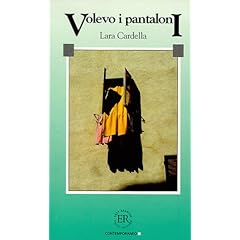Insalata di italieni:
Mentre in Italia Villari rifiuta di dimettersi e un membro dell’opposizione passa i “pizzini” ad uno della maggioranza senza che questo causi scandalo, in America Barack Obama sceglie Hillary Clinton come segretario di stato. Nella fantascienza italiana potreste mai immaginare Veltroni che nomina D’Alema o Di Pietro come vicepremier? A proposito, ma noi abbiamo anche un vicepremier?
Ennesimo articolo de La Repubblica per fare il punto sulla situazione razzismo in Italia. Si tratta di un articolo doloroso, si nominano episodi per me sempre nuovi, per esempio quello di un ragazzo a cui è stato negato l’ingresso in discoteca con queste vergognose parole: “Non crederai mica di poter entrare dappertutto solo perché adesso ha vinto Obama”. Leggi qui.
Il nano di Venezia, alias Renato Brunetta, si diletta a bacchettare gli assenteisti ma non lo si può certo definire uno stacanovista. Leggi qui.
Video di Obama che non caga Berlusconi, esilarante, farà la storia!
Parole (it)aliene:
L’innominato proprietario dell’Italia: "L'unica cosa da fare è non pagare più il canone. Il Tg3 mi insulta, mi oltraggia e mi prende in giro ogni sera...."
Memole dice: "Glielo dico alla mamma che voi mi prendete in giro..."
Sempre lui: "Ci sono sempre di mezzo io, sempre attaccato in malo modo. Sono fenomeni che tutti possono verificare guardando la tv. Quanto a trasmissioni come Ballarò, Porta a Porta, Annozero e Primo Piano ho pregato ministri e sottosegretari di non prestarsi a risse, cosa contraria agli interessi dei conduttori che dalla rissa aumentano gli ascolti, ma non dignitosa per chi ha responsabilità di governo".
Memole dice: Neanche da Vespa si può più andare? Rimane solo Emilio Fede!
Ancora lui: "Si è diffuso un clima generale di sfiducia anche per le profezie fatte circolare in Italia dalla sinistra che grida alla catastrofe. Premier e governo cercheranno di infondere fiducia ma solo i cittadini possono, non cambiando le loro abitudini, arginare la crisi reale che purtroppo sta arrivando, con una caduta verticale degli acquisti".
Memole dice: Che bello, compriamo roba che non ci possiamo permettere, così poi ci indebitiamo come gli americani! Questo dimostra quanto Berlusconi ci capisca di economia.
Nient'altro che lui: "Il mio complimento al presidente Obama è stato un pò invidioso. Tutti vorremmo essere abbronzati come Naomi Campbell e Obama...".
Memole dice: Non cambi proprio idea, eh! Sei de coccio!!!
Antonio Di Pietro: "I magistrati? Rappresentano per Berlusconi ciò che gli ebrei rappresentavano per Hitler: razza infame da eliminare, anzi dementi da mandare nei manicomi. Non lo dico io: l'ha affermato lui stesso! Non credo che bisognerà aspettare molto. La "soluzione finale" è vicina per i giudici".
Memole dice: I magistrati stanno a Berlusconi come gli ebrei stanno a Hitler??? Va bene che bisogna fare opposizione, ma ora non stiamo esagerando con le battute ad effetto? Che Di Pietro sia andato a lezione da qualche esponente della Lega per imparare a fare il populista?
Bene, e ora per concludere, posso parlare del premio che mi è stato assegnato da Uhuruna usalama, una blogger sister che consiglio a tutti di iniziare a tener d'occhio. Grazie Uhuru!!!
usalama, una blogger sister che consiglio a tutti di iniziare a tener d'occhio. Grazie Uhuru!!!
Il premio si chiama Dardos e viene asseganto ai blog "che hanno dimostrato il loro impegno nel trasmettere valori culturali, etici, letterari o personali".
Regole:
1)Accettare e comunicare il relativo regolamento visualizzando il logo del premio
2) Linkare il blog che ti ha premiato
3) Premiare altri 15 blog ed avvisarli del premio
Non ho 15 blog da premiare, anche perché i blog che seguo più assiduamente hanno a sua volta ricevuto il premio, ma cercherò di fare del mio meglio. Io premio:
Mentre in Italia Villari rifiuta di dimettersi e un membro dell’opposizione passa i “pizzini” ad uno della maggioranza senza che questo causi scandalo, in America Barack Obama sceglie Hillary Clinton come segretario di stato. Nella fantascienza italiana potreste mai immaginare Veltroni che nomina D’Alema o Di Pietro come vicepremier? A proposito, ma noi abbiamo anche un vicepremier?
Ennesimo articolo de La Repubblica per fare il punto sulla situazione razzismo in Italia. Si tratta di un articolo doloroso, si nominano episodi per me sempre nuovi, per esempio quello di un ragazzo a cui è stato negato l’ingresso in discoteca con queste vergognose parole: “Non crederai mica di poter entrare dappertutto solo perché adesso ha vinto Obama”. Leggi qui.
Il nano di Venezia, alias Renato Brunetta, si diletta a bacchettare gli assenteisti ma non lo si può certo definire uno stacanovista. Leggi qui.
Video di Obama che non caga Berlusconi, esilarante, farà la storia!
Parole (it)aliene:
L’innominato proprietario dell’Italia: "L'unica cosa da fare è non pagare più il canone. Il Tg3 mi insulta, mi oltraggia e mi prende in giro ogni sera...."
Memole dice: "Glielo dico alla mamma che voi mi prendete in giro..."
Sempre lui: "Ci sono sempre di mezzo io, sempre attaccato in malo modo. Sono fenomeni che tutti possono verificare guardando la tv. Quanto a trasmissioni come Ballarò, Porta a Porta, Annozero e Primo Piano ho pregato ministri e sottosegretari di non prestarsi a risse, cosa contraria agli interessi dei conduttori che dalla rissa aumentano gli ascolti, ma non dignitosa per chi ha responsabilità di governo".
Memole dice: Neanche da Vespa si può più andare? Rimane solo Emilio Fede!
Ancora lui: "Si è diffuso un clima generale di sfiducia anche per le profezie fatte circolare in Italia dalla sinistra che grida alla catastrofe. Premier e governo cercheranno di infondere fiducia ma solo i cittadini possono, non cambiando le loro abitudini, arginare la crisi reale che purtroppo sta arrivando, con una caduta verticale degli acquisti".
Memole dice: Che bello, compriamo roba che non ci possiamo permettere, così poi ci indebitiamo come gli americani! Questo dimostra quanto Berlusconi ci capisca di economia.
Nient'altro che lui: "Il mio complimento al presidente Obama è stato un pò invidioso. Tutti vorremmo essere abbronzati come Naomi Campbell e Obama...".
Memole dice: Non cambi proprio idea, eh! Sei de coccio!!!
Antonio Di Pietro: "I magistrati? Rappresentano per Berlusconi ciò che gli ebrei rappresentavano per Hitler: razza infame da eliminare, anzi dementi da mandare nei manicomi. Non lo dico io: l'ha affermato lui stesso! Non credo che bisognerà aspettare molto. La "soluzione finale" è vicina per i giudici".
Memole dice: I magistrati stanno a Berlusconi come gli ebrei stanno a Hitler??? Va bene che bisogna fare opposizione, ma ora non stiamo esagerando con le battute ad effetto? Che Di Pietro sia andato a lezione da qualche esponente della Lega per imparare a fare il populista?
Bene, e ora per concludere, posso parlare del premio che mi è stato assegnato da Uhuruna
 usalama, una blogger sister che consiglio a tutti di iniziare a tener d'occhio. Grazie Uhuru!!!
usalama, una blogger sister che consiglio a tutti di iniziare a tener d'occhio. Grazie Uhuru!!!Il premio si chiama Dardos e viene asseganto ai blog "che hanno dimostrato il loro impegno nel trasmettere valori culturali, etici, letterari o personali".
Regole:
1)Accettare e comunicare il relativo regolamento visualizzando il logo del premio
2) Linkare il blog che ti ha premiato
3) Premiare altri 15 blog ed avvisarli del premio
Non ho 15 blog da premiare, anche perché i blog che seguo più assiduamente hanno a sua volta ricevuto il premio, ma cercherò di fare del mio meglio. Io premio:
1) Blessing Sunday Osuchukwu, per i suoi bellissimi post sulla cultura Igbo / nigeriana / africana e quelli sulla cultura italiana. E per le poesie, naturalmente. Dalu!
2) Luca Viscje Brazil, per raccontarci alcuni aspetti curiosi ed interessanti della vita verdeoro e per saper raccontare l'Italia anche se si trova oltreoceano. Obrigada!
3) Jaska (metaoikos), con il suo nuovo blog, che ci racconta il Congo, l'India, l'Italia e molto altro. Shoukriah, Dhanyavaad, grazie, asante sana! (Ora sto cercando di strafare, me ne rendo conto...)




